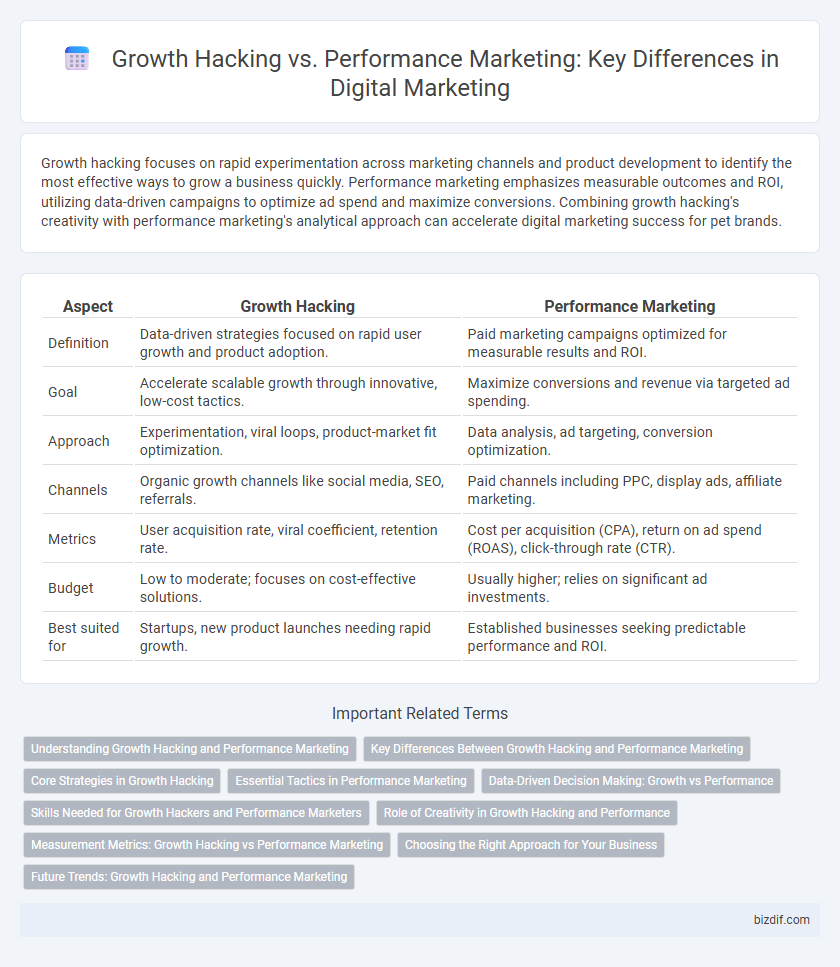Growth hacking focuses on rapid experimentation across marketing channels and product development to identify the most effective ways to grow a business quickly. Performance marketing emphasizes measurable outcomes and ROI, utilizing data-driven campaigns to optimize ad spend and maximize conversions. Combining growth hacking's creativity with performance marketing's analytical approach can accelerate digital marketing success for pet brands.
Table of Comparison
| Aspect | Growth Hacking | Performance Marketing |
|---|---|---|
| Definition | Data-driven strategies focused on rapid user growth and product adoption. | Paid marketing campaigns optimized for measurable results and ROI. |
| Goal | Accelerate scalable growth through innovative, low-cost tactics. | Maximize conversions and revenue via targeted ad spending. |
| Approach | Experimentation, viral loops, product-market fit optimization. | Data analysis, ad targeting, conversion optimization. |
| Channels | Organic growth channels like social media, SEO, referrals. | Paid channels including PPC, display ads, affiliate marketing. |
| Metrics | User acquisition rate, viral coefficient, retention rate. | Cost per acquisition (CPA), return on ad spend (ROAS), click-through rate (CTR). |
| Budget | Low to moderate; focuses on cost-effective solutions. | Usually higher; relies on significant ad investments. |
| Best suited for | Startups, new product launches needing rapid growth. | Established businesses seeking predictable performance and ROI. |
Understanding Growth Hacking and Performance Marketing
Growth hacking leverages creative, low-cost strategies and rapid experimentation focused on scalable growth, often utilized by startups to accelerate user acquisition and engagement. Performance marketing centers on data-driven campaigns with measurable KPIs and ROI, using targeted advertising channels like PPC, affiliate marketing, and social media to optimize conversions. Both approaches prioritize results, but growth hacking emphasizes innovation and agility, while performance marketing relies on structured, analytics-based optimization.
Key Differences Between Growth Hacking and Performance Marketing
Growth hacking focuses on rapid experimentation across marketing channels and product development to identify the most effective ways to grow a business, emphasizing creativity and agility. Performance marketing relies on data-driven campaigns with clear metrics such as CPA (Cost Per Acquisition) and ROI (Return on Investment) to optimize paid advertising efforts. The key differences lie in growth hacking's broader, innovative approach versus performance marketing's targeted, measurable advertising strategies.
Core Strategies in Growth Hacking
Growth hacking centers on rapid experimentation across marketing channels and product development to identify the most effective ways to grow a business quickly. Core strategies include leveraging viral marketing, content marketing, A/B testing, and data-driven user acquisition tactics to maximize growth potential with minimal budget. This approach contrasts with performance marketing's focus on paid advertising campaigns and measurable ROI metrics to optimize conversions.
Essential Tactics in Performance Marketing
Performance marketing relies on data-driven strategies such as pay-per-click (PPC) advertising, affiliate marketing, and conversion rate optimization to maximize ROI. Essential tactics include precise audience segmentation, real-time analytics, and A/B testing to refine campaigns and enhance customer acquisition. Emphasizing measurable outcomes through targeted ad spend ensures effective budget allocation and continuous performance improvement.
Data-Driven Decision Making: Growth vs Performance
Growth hacking emphasizes rapid experimentation across marketing channels and product development to identify the most effective strategies, leveraging real-time user data to fuel innovative growth tactics. Performance marketing prioritizes measurable outcomes through targeted campaigns and ROI analysis, utilizing analytics to optimize ad spend and conversion rates. Both approaches rely heavily on data-driven decision-making, but growth hacking focuses more on iterative learning and scalability, while performance marketing centers on efficiency and precise performance metrics.
Skills Needed for Growth Hackers and Performance Marketers
Growth hackers require a blend of creativity, data analysis, and coding skills to rapidly test and implement unconventional strategies that fuel exponential user acquisition. Performance marketers focus on expertise in analytics, paid advertising platforms, SEO, and conversion rate optimization to maximize ROI through data-driven campaigns. Both roles demand strong proficiency in marketing automation tools, A/B testing, and customer behavior analysis to drive sustained growth.
Role of Creativity in Growth Hacking and Performance
Growth hacking leverages unconventional and creative strategies to rapidly scale user acquisition and engagement, emphasizing innovative experimentation and agile tactics tailored to immediate growth opportunities. Performance marketing centers on data-driven campaigns with measurable ROI, relying on systematic optimization of paid channels based on analytics and conversion metrics. Creativity in growth hacking drives unique viral loops and product-led growth, whereas performance marketing applies creativity primarily in ad creatives and audience segmentation to enhance campaign efficiency.
Measurement Metrics: Growth Hacking vs Performance Marketing
Growth hacking emphasizes qualitative metrics such as user engagement, viral coefficient, and activation rates to rapidly identify growth opportunities through experimentation. Performance marketing prioritizes quantitative KPIs like cost per acquisition (CPA), return on ad spend (ROAS), and conversion rates to optimize paid campaigns and maximize ROI. Both approaches rely heavily on data analytics but differ in focus: growth hacking targets scalable growth drivers, while performance marketing focuses on measurable ad efficiency.
Choosing the Right Approach for Your Business
Growth hacking emphasizes rapid experimentation across marketing channels and product development to identify the most effective ways to grow a business, ideal for startups seeking scalable growth with limited budgets. Performance marketing focuses on measurable results through paid channels, optimizing campaigns based on data-driven KPIs like cost per acquisition (CPA) and return on ad spend (ROAS), making it suitable for businesses with established marketing budgets aiming for predictable ROI. Selecting the right approach depends on your business goals, available resources, and growth timeline, with hybrid models often providing a balanced strategy.
Future Trends: Growth Hacking and Performance Marketing
Future trends in digital marketing reveal a convergence between growth hacking and performance marketing, emphasizing automation, AI-driven analytics, and personalized customer journeys to maximize ROI. Integration of machine learning enables marketers to predict consumer behavior more accurately and optimize conversion funnels in real-time, combining growth hacking's rapid experimentation with performance marketing's data-driven strategies. Emerging technologies like predictive analytics and omnichannel targeting are set to redefine campaign scalability and efficiency in both practices.
Growth Hacking vs Performance Marketing Infographic

 bizdif.com
bizdif.com